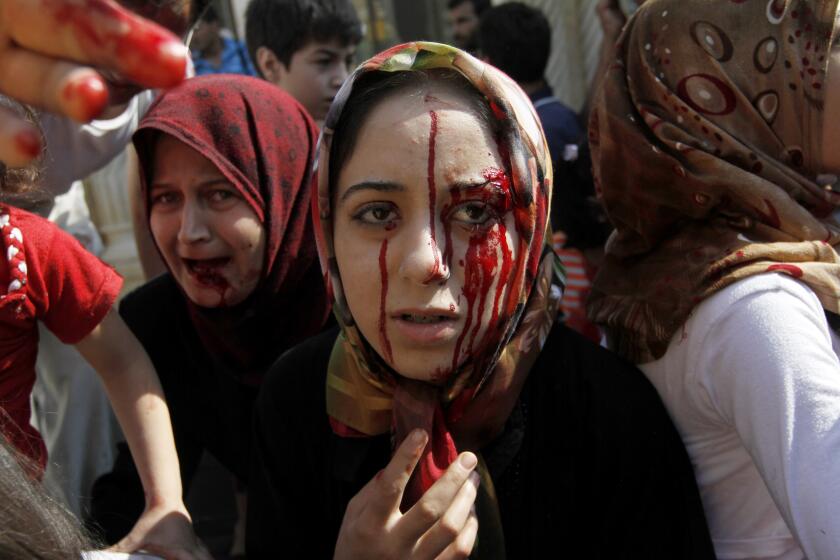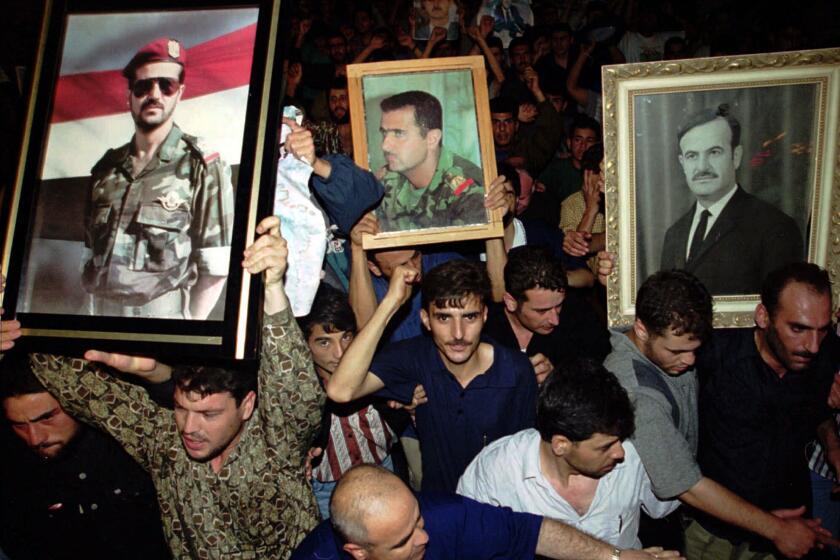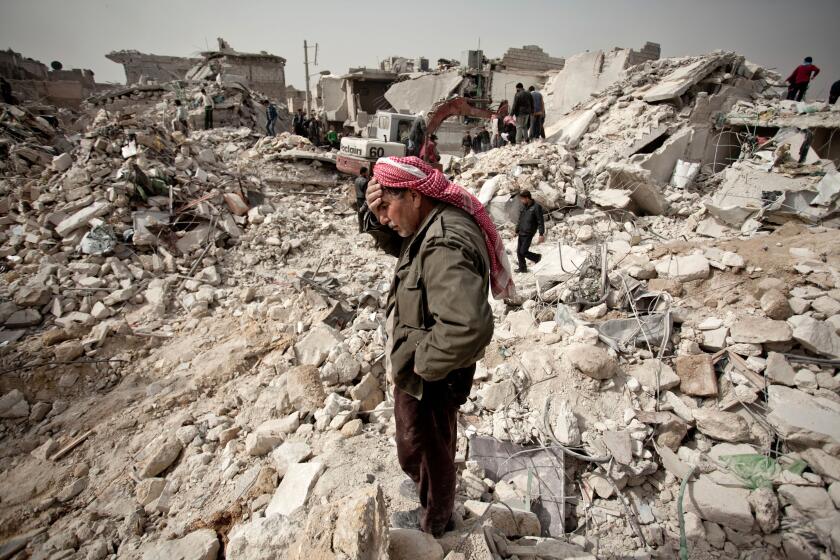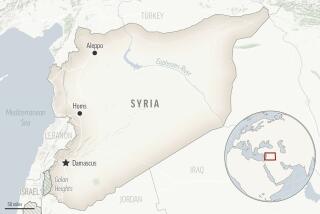Bombs in Damascus, shelling in other parts of Syria kill at least 24
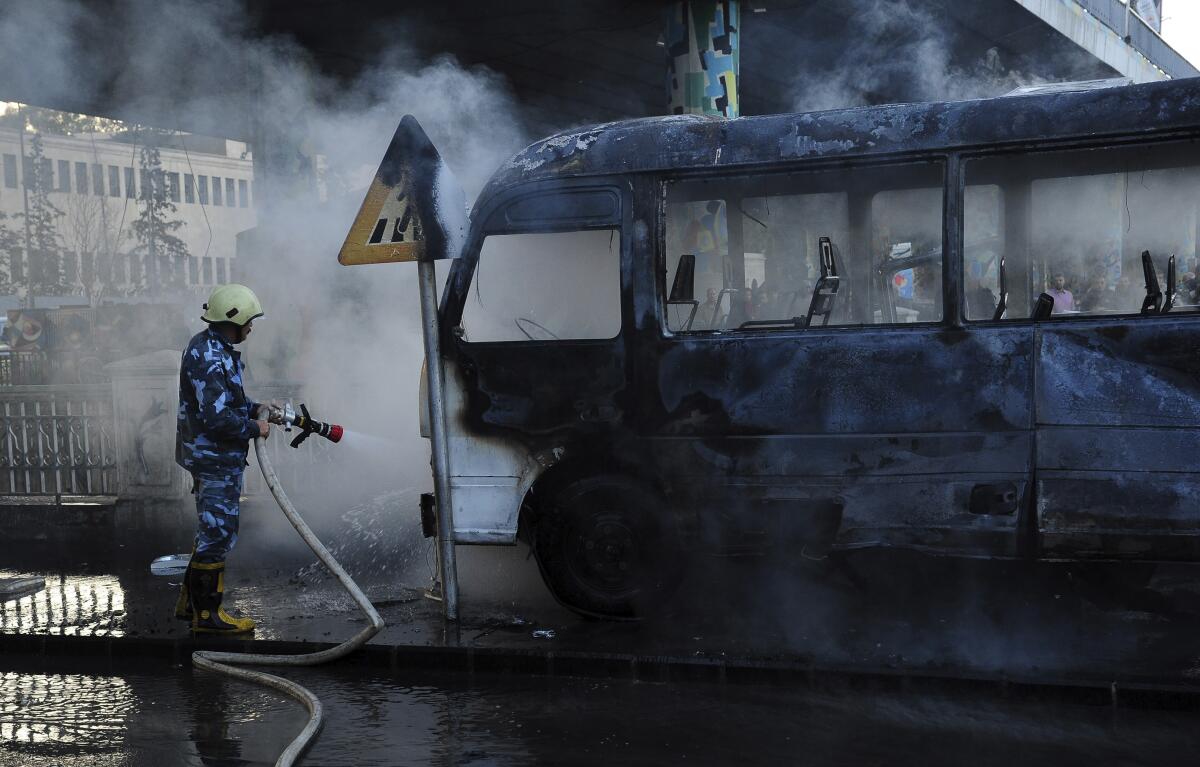
DAMASCUS, Syria â Two bombs attached to a bus carrying Syrian troops exploded in Damascus during the morning rush hour Wednesday, a military official said. Fourteen people were killed in the attack.
It was one of the deadliest attacks in the Syrian capital in years. While the Syrian governmentâs decade-long conflict with insurgents continues in parts of the country, including the rebel-held northwest, bombings in Damascus have become exceedingly rare since President Bashar Assadâs troops pushed opposition fighters out of the capitalâs suburbs in 2018.
The explosions, which also left several wounded, happened at a busy intersection, near a main bus transfer point where commuters and schoolchildren typically converge. After the blasts, Syrian state TV showed footage of smoke rising from a charred bus as soldiers hosed down the vehicle and onlookers flocked to a nearby bridge to watch.
No one immediately claimed responsibility for the attack, but insurgents and jihadists that seek the overthrow of Assad are active in Syria.
Separately, rescue workers reported that 10 people were killed, including four children, in government shelling of a town in the last rebel enclave in the countryâs northwest. United Nations deputy regional humanitarian coordinator Mark Cutts described reports of the shelling as âshocking.â The attack hit a market and roads near schools as students were heading to classes.
In addition to the four children killed, their teacher died, according to UNICEF, the U.N. childrenâs agency.
Ten years later, Syriaâs civil war, with its untold numbers of dead, serves as a bleak example of possibility and hope crushed by conflict and chaos.
âTodayâs violence is yet another reminder that the war in Syria has not come to an end. Civilians, among them many children, keep bearing the brunt of a brutal decade-long conflict,â the agency said. âAttacks on civilians including children are a violation of international humanitarian law.â
The attack was one of the most violent in the area since a March 2020 truce in the northwest negotiated by Russia and Turkey â allies of the Syrian government and the opposition, respectively. The truce has been repeatedly violated, and government forces often vow to take territories still out of their control.
In the central city of Hama, meanwhile, an explosion at an arms depot left six pro-government fighters dead, according to the Syrian Observatory for Human Rights, an opposition monitoring group. The pro-government Sham FM radio station also reported that six fighters were killed in a depot explosion but did not give a location.
While fighting still rages in the northwest, Assadâs forces now control much of Syria after military support from allies Russia and Iran helped tip the balance of power in his favor. U.S. and Turkish troops are deployed in parts of the countryâs north.
On Nov. 13, 1970, Hafez Assad, a young career air force officer, took power in Syria in a bloodless coup, the latest in a succession of military takeovers since independence from France in 1946.
In recent years, attacks like Wednesdayâs have been rare in Damascus. One of the last major explosions to hit Damascus was in 2017, when suicide bombers struck a judicial office building and a restaurant, killing nearly 60 people. Responsibility for the attacks was claimed by Islamic State militants. The extremist organization lost its territorial gains in Syria in 2019, but it continues to represent a threat with sleeper cells, mostly hiding in Syriaâs expansive desert.
State media initially described the Damascus attack as a roadside bombing. But they later quoted an unnamed Syrian military official as saying that bombs were attached to the vehicleâs exterior. A third bomb fell from the bus and was dismantled by troops after the two explosions, the official said.
It was unclear if the bombs were detonated from a distance or if they had been timed to go off. The military official, quoted in state media, said the bombs went off shortly before 7 a.m. local time. It was not immediately clear if all the dead were bus passengers.
âIt is a cowardly act,â Damascus police commander Maj. Gen. Hussein Jumaa told state TV, adding that police had cordoned off the area immediately and made sure there were no more bombs.
Jumaa said 14 people were killed, including one person who was initially listed as wounded but later died.
Breaking News
Get breaking news, investigations, analysis and more signature journalism from the Los Angeles Times in your inbox.
You may occasionally receive promotional content from the Los Angeles Times.
It was not immediately clear if all the dead were bus passengers. The military official said the bombs went off shortly before 7 a.m. Over an hour later, workers had cleared the scene, and the burned-out bus was removed.
Wednesdayâs shelling in the northwest hit the town of Ariha, in Idlib province, which is mostly controlled by rebel groups, including the dominant Hayat Tahrir al-Sham, once affiliated with Al Qaeda.
The Syrian Civil Defense, also known as White Helmets, said that, aside from the 10 people killed, 20 more were wounded when dozens of shells landed in the town. The rescuers said they were still searching through the wreckage for survivors.
Syriaâs civil war, which began in March 2011, has left more than 350,000 people dead and displaced half the countryâs population, including 5 million who are refugees abroad.
âRoundabout of Death,â Syrian author Faysal Khartashâs first book translated into English, plumbs the pain and monotony of a devastating civil war.
On Wednesday, New York-based Human Rights Watch called on countries hosting Syrian refugees, including some European nations, to stop forcing them to return to the war-torn country. The rights group said that, while armed hostilities may have decreased in recent years, the Syrian government has continued to commit the same abuses against citizens that led them to flee in the first place.
In its report, Human Rights Watch said it has documented 21 cases of arrest and arbitrary detention, 13 cases of torture, three kidnappings, five extrajudicial killings, 17 enforced disappearances and one case of alleged sexual violence among 65 refugees or family members interviewed.
âThe harrowing accounts of torture, enforced disappearance and abuse that refugees who went back to Syria endured should make it patently clear that Syria is not safe for returns,â said Nadia Hardman, refugee and migrant rights researcher with Human Rights Watch.
More to Read
Sign up for Essential California
The most important California stories and recommendations in your inbox every morning.
You may occasionally receive promotional content from the Los Angeles Times.
